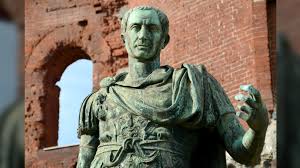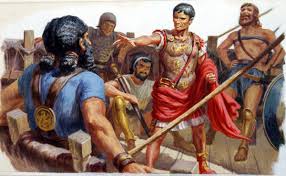Your basket is currently empty!
The Unbelievable Abduction at Sea
In 75 BCE, a young Julius Caesar, just 25 years old, was sailing across the Aegean Sea when he was captured by Cilician pirates. At the time, these pirates roamed freely along the Mediterranean coast, preying on Roman elites and demanding ransoms. The captors initially asked for 20 talents of silver, but Caesar, insulted by the low price, insisted they ask for 50—a sum worth millions today. He sent his men to gather the money and spent 38 days as their “guest”, calmly writing speeches and poems while in captivity.
Caesar’s Audacity in Captivity

Caesar didn’t act like a typical prisoner. He treated the pirates as if he were their commander, often shushing them when he wanted to sleep and reciting speeches they didn’t understand. He even joked that he would return and have them crucified, which the pirates took as arrogant humor. However, they would soon realize he wasn’t joking. His behavior stunned the pirates, who saw in him something more than a noble youth—a man destined for greatness.
The Ruthless Revenge
Once the ransom was paid and Caesar was released, he quickly raised a private fleet, hunted down the pirates, and captured them all. True to his word, he had them crucified, though he showed a “mercy” by ordering their throats cut first—a quicker death. This act showcased Caesar’s calculated ruthlessness, a trait that would define his military and political career. The Roman authorities had done nothing to stop the pirates, so Caesar took justice into his own hands. The entire episode cemented his reputation in Rome as both brilliant and dangerous.
Lessons from Caesar’s Pirate Ordeal
This early episode in Caesar’s life reveals much about his ego, charisma, and strategic mind. While many would have panicked, Caesar saw an opportunity to display leadership and cunning, even in chains. His response to captivity was not fear, but planning—and vengeance. The story has become a legendary example of how great leaders handle adversity. It’s one of many fascinating tales from ancient Roman history that shows how myths are often rooted in truth.
Conclusion with CTA
Julius Caesar’s pirate story is more than a thrilling tale—it’s a glimpse into the mind of one of history’s greatest tacticians. Want to learn more about Rome’s most ambitious leaders?
Explore more historical war machines on our Legends and Myths site.

